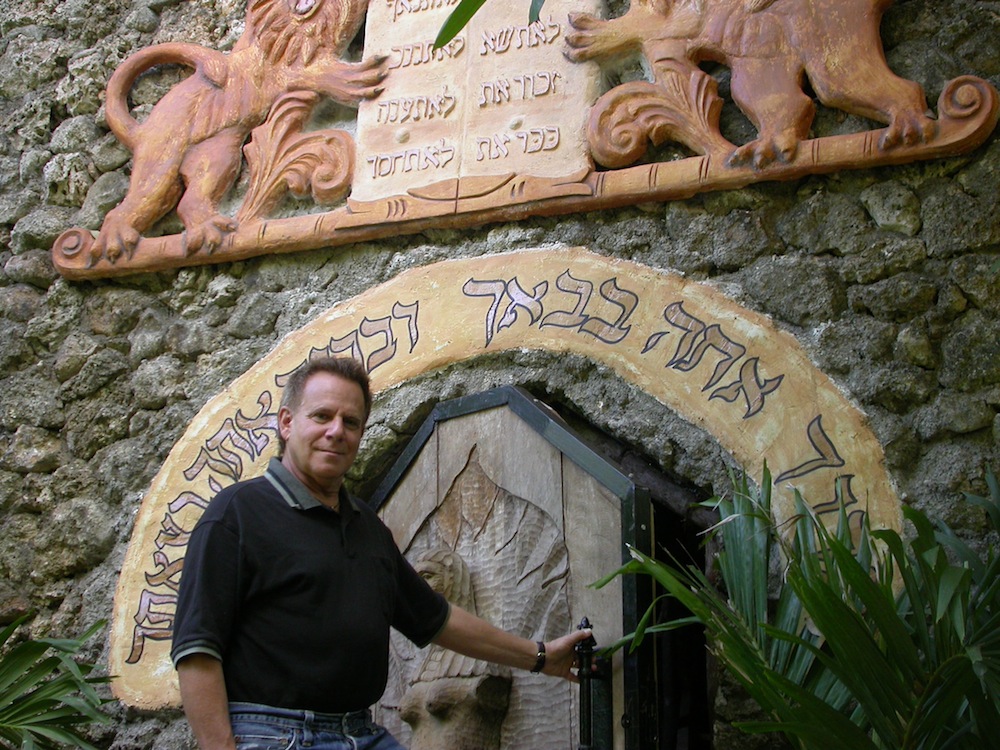
From the ashes of lost love, a Washington doctor conjures an Afro-Jewish resort in the Caribbean
When Dr. Paul Rhodes, a Washington, D.C. geriatrician, fell in love with “an exquisitely beautiful Jamaican woman I had been dreaming of,” he also fell hook, line and sinker for four acres of cliffside land on her native island.
The rugged parcel was bushy and craggy, but had breathtaking views of mountains, an azure bay and the Caribbean Sea. He was blown away — and so was his beloved.
“She said she wished to live and die on the land,” Rhodes recalled.
But soon his love ran off with a local chef.
Rhodes, an associate professor of medicine at George Washington University and Howard University, had already been smitten by Jamaica and its people. In the 1970s, as a fourth-year medical student, he worked on a University of the West Indies public health project in the rural Jamaican parish of Hanover. He later set up a small charity to help support the island’s old age homes, and co-founded a shelter for street people near his parcel, in the northeast coastal town of Port Antonio.
Jamaica became his second home.
For years he lived a bi-national existence, making housecalls to homebound elders in underserved areas of Washington, while overseeing the homeless shelter in Jamaica.
Then, nearly a decade ago, he decided to create “something fantastic” on his dream land.
“All right, I don’t have the woman,” he reasoned. “I have the land.”
He conjured a tranquil African village.
The result was Great Huts, a cluster of a dozen West African-inspired dwellings. The huts fit beautifully with the landscape, says Rhodes. “we proud to say we are the un-villa”
Rhodes, 62, a Brooklyn, New York-born Jew, wanted the land to fuse elements of Jewish and African culture.
There are lots of carved cedar lions around. The biblical Lion of Judah is both the symbol of the Israelite Tribe of Judah, and of the late Emperor Haile Selassie of Ethiopia, whom Rastafarians revere as a messiah (believing Selassie to be direct descendant of the Tribe of Judah, through the lineage of King David and Solomon).
A lion, made by a Rastafarian artist, stands on its hind legs atop Great Huts’ tallest structure, the three-story 34-foot-high stone, wood and thatch hut “African Sunrise.”
“It gives a feeling of being on the fly bridge of a ship,” Rhodes said.
A path leading from this dwelling to other buildings on the property is intended to evoke Middle Passage, the route across the Atlantic slaves ships traveled, from Africa to the West. Some 15 million enslaved Africans perished on those journeys.
A life-sized wood sculpture of slaves breaking free from their shackles stands in the Great Huts lobby.
There’s another Jewish-African connection in Queen of Sheba, a luxurious three-story dwelling of honeycomb coral and fossilized limestone boulders. The 30-foot-long bedroom features a hot tub, small fish pool with a waterfall, and large window in the shape of the Star of David (a Rastafarian as well as Jewish symbol). The Queen of Sheba traveled from Ethiopia to Jerusalem to test the legendary wisdom of King Solomon; some Rastafarians link Selassie to Menelik, son of Solomon and the queen. A painting portraying their meeting in Jerusalem adorns the wall of another hut.
Deep sand on the floor of one hut is meant to evoke a makeshift synagogue. During the Inquisition, when Jews had to worship in secret, they used sand as a carpet to muffle their footsteps. Rhodes sometimes sleeps here on the sand.
Another hut is called The Tabernacle, after the portable central place of worship of the Israelites after they left Egypt. Their priests would enter the Tabernacle to commune with God.
“Akan Tower,” is meant as a reminder of certain commonalities in African and Jewish beliefs. Some scholars believe Hebrew and the West African Akan cultures have in common aspects of language, religion and culture, and that there must have been an intermingling in the past. In both cultures, there’s an emphasis on Old Testament teachings, eating kosher and unshaven heads and faces.
In Lemba Hut, Rhodes features the Lemba, a South African ethnic group that many suggest has links to Judaism. The Lemba observe Shabbat, practice male circumcision, eschew pork and engrave the Star of David on their tombs. Genetic testing has suggested a relationship.
On Saturday nights, Rhodes conducts a Havdalah service, to close out the Sabbath. The lighting of a braided candle, the use of fragrant spices and a ritual pouring of wine usually precede a torch-lit cultural performance of African dancing and drumming. The dance floor is emblazoned with a mosaic of an elephant and a lion, symbols common to African and Jewish culture typically represented on the floors of Israeli synagogues.
Marking 350 years of continuous Jewish presence on the island, Rhodes also offers a faith tourism tour of Jamaica’s small Jewish community, of about 200 people. The tour includes a visit to the island’s sole synagogue, and its Jewish cemetery, with tombstones dating back to the 1600s.
Art is everywhere: fantasy masks and Afro-centric work by Jamaican carvers, painters, sculptors and ceramicists. Many grace a colorful second-floor, open-sided dining and lounge area with elegant wrap-around cushioned seating, carved chairs and tables. The long neck of a 15-foot papier-mache giraffe pierces the ceiling.
“I’m borderline obsessed with beauty and design,” said Rhodes, “and suffer a compulsion to acquire beautiful things.”
Volunteers who help out at Dr. Rhodes’ homeless shelter are put up for nominal prices. Visitors are picked up at the airport, and transported here via a 2 1/2 hour taxi ride.
The nearest community is Boston Beach, traditional home of Jamaican jerk-style cooking. From there it’s a short drive or walk, along a dirt path, to Great Huts’ guarded gates.
Rhodes’ dream for Great Huts is still evolving, but one aspect of it has come full circle. He’s married to an actress, Nikki, a beautiful Jamaican woman he calls his “correct” soul mate.
Merle English is a New York-based writer.
What's your view?
You must be logged in to post a comment.




